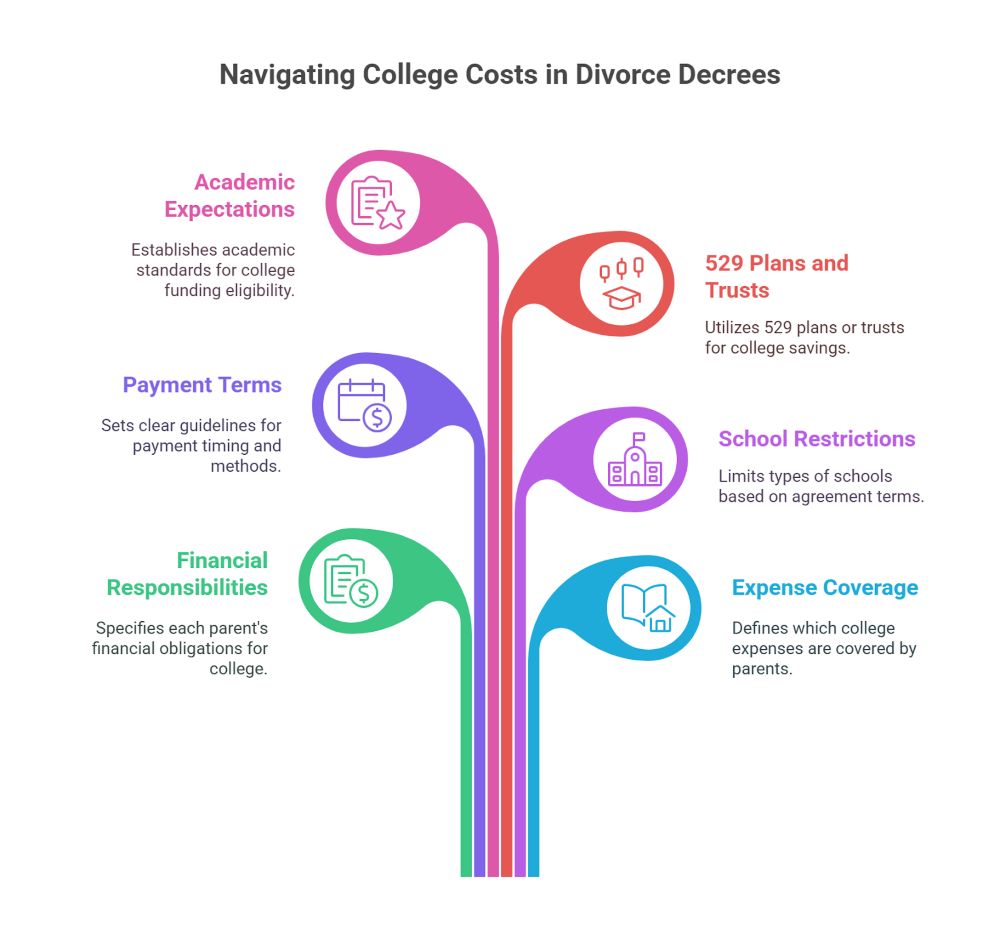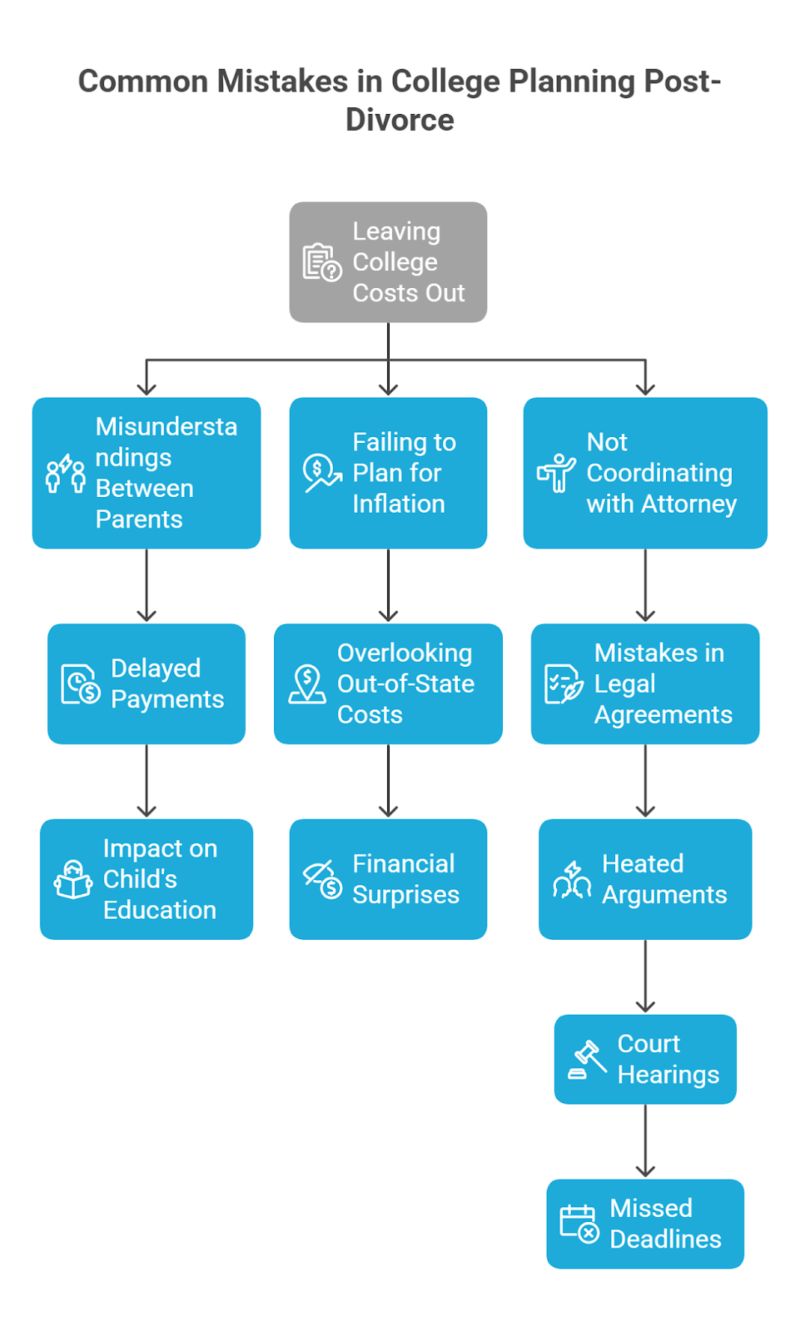

Originally published: June 2025 | Updated: August 2025
College tuition is rising every year, making the prospect of paying for school a significant concern for divorced parents in Illinois.
Illinois law allows courts to order one or both divorced parents to contribute to their child’s college expenses, so protecting your child’s future starts with having a clear plan.
Handling college costs after a divorce can be confusing. Taking the right steps now can help avoid problems later.
Many parents are surprised to learn that, unlike most states, Illinois courts may require parents to share the financial responsibility for college even after divorce.
This makes it crucial to address college funding during divorce proceedings so that all parties understand their roles and obligations.
Understanding these rules helps both parents and children avoid costly surprises when it comes time to apply to college.

College costs in Illinois have risen faster than the incomes of many families.
Divorced parents must navigate changing financial responsibilities, making early planning essential to avoid confusion and conflict.
The average yearly cost for tuition, fees, and living expenses at public universities in Illinois is now more than $30,000. Private colleges can cost more than $60,000 per year.
These figures do not include additional expenses such as textbooks, transportation, and health insurance.
According to recent analysis, the average annual college tuition in the U.S. is approaching $40,000.
This trend puts growing pressure on Illinois families who may already be coping with higher living costs or stagnant wages.
Planning how to pay for college is important because scholarships, grants, and financial aid are not guaranteed to be available.
Families who save early or set clear expectations are often able to provide more support for their children’s education.
Divorce can leave parents uncertain about who will pay for college, which can impact their savings plans and their eligibility for financial aid.
When parents separate, agreements regarding the payment of higher education expenses may not be in place or may be unclear.
A separation often means assets are split and incomes change.
This shift can reduce the funds saved for college and may leave children uncertain about their future.
Without a clear divorce agreement, conflicts can arise over who pays which expenses or how much each parent is expected to contribute.
Legal professionals suggest that good divorce agreements should set guidelines for college funding, including details on how costs are divided and whether both parents must approve college choices.
This can help minimize stress and protect the child’s educational future.
Illinois law outlines how college costs are divided when parents divorce.
Courts can order parents to contribute to a child’s higher education, and the rules governing these contributions are established by state law.
Under 750 ILCS 5/513, both parents may be required to contribute to post-secondary education support in Illinois.
This means the court can order either or both parents to pay part or all of college expenses, even if the child is over 18.
Covered expenses often include tuition, fees, housing, books, and sometimes transportation and healthcare.
The law also sets a limit, so parents usually do not have to pay more than the cost of in-state tuition at the University of Illinois.
Payments can be made directly to the school, to either parent, or the child for reasonable expenses.
Courts decide the division based on each family’s unique situation.
Judges consider several factors when determining who pays for college after divorce in Illinois.
Important things they consider include:
A parent’s ability to pay is a major focus. The court ensures that the obligation does not create an unfair hardship for either parent.
Judges may adjust the order if either parent’s financial situation changes or if the child’s educational plans change.
The law covers children who are seeking post-secondary education support in Illinois.
Eligibility depends on:
A child must generally remain a full-time student in good academic standing to keep receiving support.
Courts rarely order support for graduate studies, focusing instead on undergraduate or professional programs.
Both biological and adopted children may qualify under 750 ILCS 5/513, provided the court finds the request to be fair and necessary.
College doesn’t pay for itself, especially after divorce. Cooper Trachtenberg Law Group helps Illinois parents lock in funding plans during settlement. Contact us today to secure your child’s future.
If you’re ready to get started, call us now!

In Illinois, divorced parents are not always legally required to pay for their child’s college expenses.
Making college funding terms clear in the divorce decree helps families avoid confusion about who pays, how much, and what qualifies as an expense.
Spelling out college cost responsibilities in the divorce settlement can help both parents prevent arguments years later.
If details about tuition, books, housing, or other fees are not included in the Illinois divorce decree, one parent may refuse to help pay.
This leaves the other parent—or the child—taking on all the expenses.
Without clear terms, parents may need to return to court if a dispute arises.
This can cause stress for the entire family and may force the child to delay or change their college plans.
Including a college funding clause helps set clear expectations, so both sides know what to plan for financially.
A strong college cost clause in an Illinois divorce decree should be clear and specific.
It usually covers:
Itemizing these details helps avoid confusion later.
Parents can also agree to review costs each year or set a cap based on current state university tuition rates.
This makes it easier to adjust as college prices go up.
The law gives Illinois courts the power to order parents to help with these expenses if it was agreed upon in the original Illinois divorce decree, including college tuition.
Parents often use a Bright Start 529 account after their divorce in Illinois to save for college with tax benefits.
Including a 529 plan in the divorce tuition clause can help ensure money is set aside and used only for the child’s education.
A divorce settlement college cost agreement may name who will manage and contribute to the account.
It can restrict withdrawals to only pay for approved college costs.
Alternatively, some parents choose to set up an educational trust for similar protection.
Clearly outlining the use of 529 plans or trusts in the divorce decree can create security and avoid conflicts over how the funds are handled.
Setting up and agreeing on these plans early can make paying for college smoother for divorced families.
It can also help streamline the college cost parenting plan in Illinois.
When parents in Illinois divorce, applying for college financial aid, such as the FAFSA, can raise unique concerns.
Changing rules may affect which parents’ finances are considered, how much aid a student receives, and how this process compares to other forms, such as the CSS Profile.
As of the 2024-2025 school year, the FAFSA now considers the parent who provided the most financial support in the past year, rather than just the parent with whom the student lived.
This change is particularly important for Illinois families navigating divorce and the FAFSA rules for divorced parents.
Legal custody is not the deciding factor in determining custody. Instead, what counts is the support provided.
If support is equal, then the parent with the higher income must complete the form.
This updated rule applies even if the legal custody arrangement is 50/50 split of expenses.
Here’s a quick look:
| Old Rule | New Rule |
| Lived with most in the last 12 months | Provided most financial support in the previous 12 months |
For parents sharing expenses or switching custody, keeping careful records is important.
Divorce can sometimes improve financial aid chances if only one parent’s income and assets are counted.
If the parent providing the most support has a lower income than the other parent, the expected family contribution may be lower, resulting in a higher level of financial aid.
However, divorce can complicate applications when support, custody, or income changes after separation.
For example, if parents split after taxes are filed, families must still use tax information from the previous year. They may need to notify colleges about any recent changes to their financial situation.
Colleges may require additional paperwork and offer assistance in documenting changes.
Families should keep track of who pays for what during the year and communicate with financial aid offices if the household’s financial picture changes.
The FAFSA and CSS Profile treat divorced parents differently. The FAFSA only requests information from the parent who provides the most financial support.
The other parent’s income is not reported unless the parent has remarried, in which case a stepparent’s information may be required. The CSS Profile, used by some private schools, often requires information from both biological parents.
Even if a parent does not have legal custody or is not involved, their financial details may still be needed.
Here’s a comparison:
| Form | Parent Info Needed |
| FAFSA | Parent giving most support (plus spouse, if remarried) |
| CSS Profile | Usually, both biological/legal parents (sometimes stepparents too) |
Families applying to colleges that use both forms should plan for these differences. Be prepared to provide more detailed financial information for the CSS Profile.
In Illinois, divorced parents may be required by court order to contribute to their child’s college expenses.
When one parent refuses to pay, legal steps can be taken to enforce these obligations and ensure the child’s educational needs are supported.
In Illinois, a parent can request that the court order the other parent to make college expense contributions if they refuse to pay voluntarily.
This often occurs when a disagreement arises after the child turns 18, as child support for college is separate from standard child support.
The law allows the court to order parents to share the costs of college, including tuition, housing, books, and other related expenses.
These costs typically have a cap at the amount charged by the University of Illinois at Urbana-Champaign, unless the court determines there is a compelling reason to exceed this amount.
If a parent does not follow the court order, the other parent or the child may request enforcement by filing a motion in court. The judge may then issue consequences for non-payment and set up a payment schedule.
Enforcing college contributions can be difficult for several reasons. Sometimes, the parent refuses to pay claims because they cannot afford it or disputes what costs are “reasonable.”
In some situations, communication breaks down, making it hard to agree, or the parent simply ignores the court order.
Another challenge is determining which expenses qualify under Illinois law, particularly for items such as travel or personal expenses.
If the child’s grades fall below a “C” average, or if they get married, get a full-time job, or turn a certain age (often 23), the obligation to pay may end, complicating enforcement. Parents may also struggle to gather documentation or find legal help.
Illinois courts offer several options for addressing non-payment. Judges may garnish wages, intercept tax refunds, or place liens on property to collect overdue support for college costs.
In certain situations, the court may add interest to unpaid amounts to encourage payment. If the refusal continues, a judge can hold the parent in contempt of court.
This means they could face fines or even jail time for failing to comply with the court’s order. The court may also require the parent to provide regular financial updates to track their ability to pay.
Unsure how to divide tuition costs after divorce? Cooper Trachtenberg Law Group crafts enforceable education clauses that protect your child and prevent future courtroom battles. Schedule your private consultation today.
If you’re ready to get started, call us now!

Many Illinois parents face unique challenges when planning for their child’s college expenses after a divorce. Careful planning and informed decisions are important to avoid financial stress and future disputes.
One major mistake is not including college funding in the divorce agreement or parenting plan. If details about tuition, housing, and other college expenses are left out, this can lead to misunderstandings between parents.
Without a clear agreement, it is not always obvious who will pay what part of the costs or which expenses are even covered. This can delay payments and impact the child’s ability to register for classes or secure suitable housing.
Illinois law allows courts to order parents to pay for college expenses, but leaving these issues out of the settlement can force families back to court.
Some parents do not account for the fact that tuition and living expenses often rise every year. If a divorce settlement only considers the current costs, parents may be caught off guard when prices increase.
Another frequent problem is overlooking out-of-state or private college tuition. These schools can charge much higher rates than public in-state schools, and the difference can be thousands of dollars each year.
To avoid surprises, it is smart to include language about how to handle increased costs and to set limits or guidelines for the types of schools a child can attend.
Consider using a divorce college savings plan, such as a 529 account, which grows over time and helps manage rising educational expenses.
Attempting to resolve college funding issues without professional assistance can lead to mistakes. Family law attorneys are familiar with the specific rules in Illinois, including 750 ILCS 5/513.
An experienced lawyer can help parents understand their rights and what a court might order for college costs. Attorneys can also draft clear legal agreements that cover future changes, such as tuition increases or modifications to custody or income arrangements. Working with a family law attorney can prevent heated arguments, court hearings, and missed deadlines.
Legal guidance helps both parents and children maximize the benefits of available college resources, ensuring that each party understands their respective obligations.
Families facing divorce in Illinois often worry about how to protect their children’s college savings.
Cooper Trachtenberg Law Group leverages its legal experience to assist parents in establishing clear college funding arrangements while addressing education costs during the divorce process.
Cooper Trachtenberg Law Group assists parents in incorporating college expense agreements into their divorce settlements. They use Section 513 of the Illinois Marriage and Dissolution of Marriage Act.
This law allows courts to order payments for a child’s college tuition, housing, books, and other expenses until the child completes their undergraduate degree. The attorneys at Cooper Trachtenberg Law Group use plain language to ensure that families understand their rights and responsibilities.
Provisions often outline who pays for tuition, what type of school qualifies, and how expenses are divided. By clearly outlining costs, deadlines, and payment methods, families avoid future disputes.
Documents are drafted to be enforceable by Illinois courts. This means both parents are held responsible if one fails to pay for their share of educational expenses.
Such planning can ensure steady funding for a child’s college education without confusion after divorce.
Cooper Trachtenberg Law Group assists parents in discussing college funding during mediation, where reaching an agreement is often less stressful and less expensive.
Mediation enables both parents to express their concerns and make decisions together, resulting in customized solutions for their child’s future.
If mediation is not possible, they represent clients in court. Judges can determine specific details about dividing costs, using state guidelines and the child’s needs.
The goal is to protect education funds and ensure that parents adhere to the agreed-upon terms, even in the event of future disagreements. These lawyers also work to safeguard unique assets, such as 529 college savings plans.
With careful legal guidance, they can protect your child’s college fund during a divorce case and ensure funds are not used for other purposes.
Cooper Trachtenberg Law Group takes a long-term view when helping clients. They plan for future education expenses, not just immediate costs.
Agreements can be tailored to cover four or more years of schooling, including tuition, books, and housing. This flexibility applies even if a child’s plans change.
If circumstances change, such as a parent’s job loss or a significant increase in college costs, the firm can help update the court orders or settlement terms.
The firm pays close attention to the details that matter for children’s academic success.
From specifying payment methods to ensuring continued access to college funds, their support is vital for protecting education funds after divorce in Illinois.
Don’t leave college funding to chance. Cooper Trachtenberg Law Group builds divorce agreements that safeguard your child’s academic goals. Contact us now to schedule your personalized education strategy session.
Can Illinois courts require divorced parents to pay for college?
Yes. Under 750 ILCS 5/513, Illinois courts may require one or both divorced parents to contribute to their child’s post-secondary education expenses, including tuition, housing, books, and medical insurance.
What are considered “reasonable college expenses” under Illinois law?
Reasonable expenses typically include tuition, room and board, textbooks, and fees, up to the cost of attending the University of Illinois as an in-state student.
Does child support cover college tuition in Illinois?
No. Standard child support usually ends at age 18 or high school graduation. College costs must be addressed separately in the divorce decree or through 750 ILCS 5/513.
Who fills out the FAFSA if the parents are divorced?
The FAFSA must be completed by the custodial parent—the one with whom the student lived the most in the past 12 months, not necessarily the parent who claims the child on taxes.
What happens if one parent refuses to pay for college?
If college costs were included in a court order or divorce decree, you can file a motion to enforce the agreement. Courts may order wage garnishment or contempt penalties for nonpayment.
Can parents negotiate college contributions privately in a divorce?
Yes, and it’s highly recommended. A written agreement outlining each parent’s obligations is legally enforceable and prevents future disputes.
Can 529 college savings plans be divided in a divorce?
Yes. The divorce decree should specify ownership, control of withdrawals, and how future contributions will be handled to prevent misuse or loss of funds.